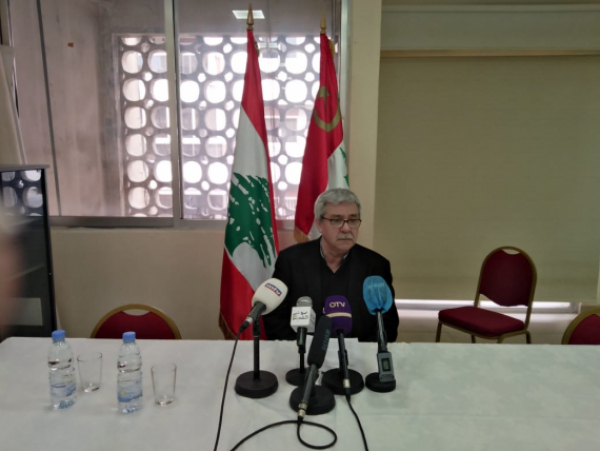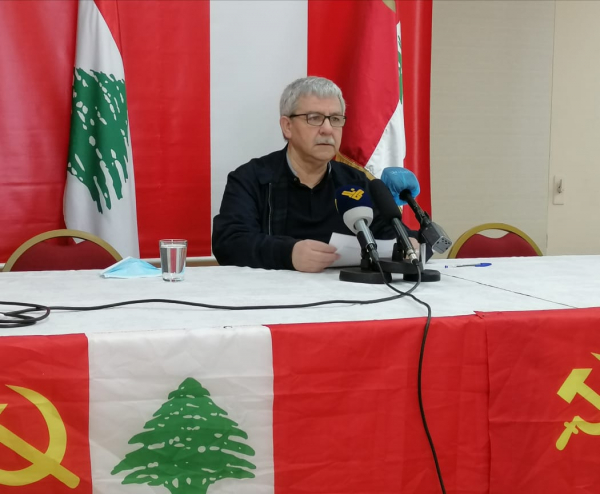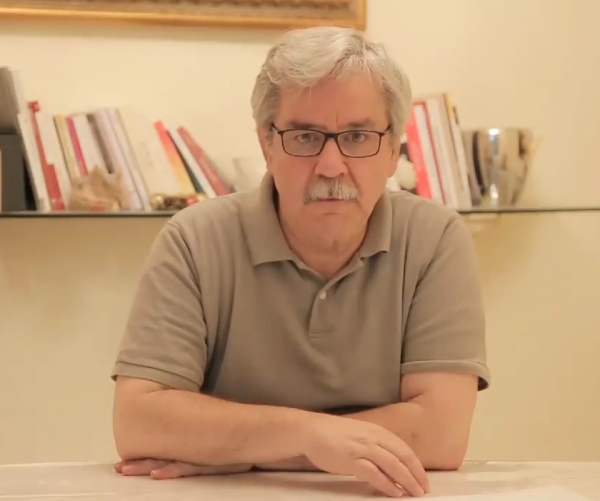Press Conference by the General Secretary of the L.C.P, Hanna Gharib
The Lebanese population is experiencing disappointment, anger, and frustration as a result of the political establishment’s conduct and hostility. Over the past few decades, the country’s political elites have violated basic human needs and rights and paved the way for political and financial catastrophes. The October 17 uprising, which was a signal for hope for thousands of citizens, did not deter their policies, nor did it ring a bell in their deaf ears. Ironically enough, the Beirut port explosion, which caused hundreds of deaths and thousands of injuries, has not led to any tangible accountability measures. Unfortunately, the country’s political establishment proceeded to adopt a set of measures that have led to increased levels of poverty, hunger, unemployment, and health drawbacks. The newest of these was the clear pressure on the judiciary, in order not to proceed with the allegations made by the General Prosecutor, who is investigating the responsibilities of different entities involved in the administration and management of Beirut Port. Three weeks ago, the political authority failed to meet the requirements of the Forensic Audit, previously adopted by the Council of Ministers. In this context, the political authority feared the outcome of such an investigation of its different branches, including the Central Bank (which is supervised by the executive branch by law) that did not provide the audit company with the set of documents needed to carry out the audit. Moreover, it was not in the political authority's interests to push for the adoption of laws to recover stolen public assets; that money was transferred abroad post -October 17, with no clear and standard criteria applicable to all bank depositors. To add to this list, Lebanon’s political class failed to issue a law regulating financial transfers and preventing breaches and discretionary measures in the banks’ stance on this issue. By disregarding the multiplicity of the Lebanese pound’s exchange rates, in order to protect their mutual interests through the Central Bank, it was willing to attack the remaining resources and property of the state, under the pretext of protecting the depositors' stolen money. In blaming the Lebanese for the consequences of the Corona pandemic, it revealed the weakness of the public health sector, as a result of privatization and making allowances for the monopolistic groups controlling the sector, especially the drug market and medical supplies. Unfortunately, the political authority is currently heading towards the lifting of subsidies on basic commodities such as wheat, medicine and fuel.
Based on the above, the Lebanese Communist Party believes that saving Lebanon largely depends on the power of the people. We have full hope in this power and its impact on the historic moment this country is witnessing. Not only is the local political scene critical, but the entire region seems to be witnessing a process similar to the Sykes-Picot agreements. Many plans designed to politically control the region aim to fragment its national unity, imposing American-Zionist conditions and spreading normalization, in addition to enforcing wars and sanctions, in order to put an end to the Palestinian cause and remove it from the global agenda- similar to what the Deal of the Century describes. Indeed, the country’s political establishment had made it easy for the US administration to carry out its project in Lebanon. A project that aims at complying with several matters that the USA needs from the Lebanese authorities. One of these requirements is robbing public and private money, and dragging the Lebanese people into dangers of chaos, famine and quasi-mass immigration, in the wake of the collapse of the Lebanese pound, all of which will worsen with the cessation of basic consumer goods subsidies.
All of these matters should be viewed as the refusal of this ruling system to return what was stolen, from savings to public assets. Our party considers that the different political factions will continue down this path, even if it leads to a dead end, because this will facilitate the intervention of foreign powers in Lebanon’s domestic affairs. This intervention is seen as an opportunity rather than a threat by the country’s political factions. In fact, it will become easy for them to push their agendas in a trade-game. Moreover, the key political entities have several winning cards and they can constitute a significant competitive advantage. This way, the bargaining power vis-à-vis the foreign powers becomes solid and strong.
As for eliminating subsidies on the essential commodities, the LCP sees this issue from a different angle. The country’s political establishment had provided these subsidies because of its failure to manage a much bigger problem: the collapse of the Lira exchange rate. While this issue could be perceived by the wider population as support from the government or the Central Bank, reality dictates that it is entirely the opposite. Subsidizing medicine, wheat and fuel prices at the present time is nothing but a camouflage for the state’s inability to address the causes of the currency collapse, that is deeply rooted in the economic and financial policies adopted since the 1990’s. A core element of these policies was when the Lebanese Pound (LBP) was pegged at the rate of USD/LBP 1507.5. Another facet of the economic crisis is visible through the government’s failure to deal with the deterioration of purchasing power of wages and incomes, and the failure to enforce a new wage hike, even though the Lebanese pound has lost more than 80% of its value to the dollar since the fall of 2019.
The current policy of subsidizing essential commodities was a main pillar in a system engineered by warlords, the upper class bourgeoisie, and sectarian leaders. This tripartite alliance benefited from this system because it enlarged the clientelism and patronage networks. This policy was adopted without even estimating its cost-benefit analysis. It was later expanded to include subsidizing the benefits of debt service and the interest of loans granted to institutions and non-popular housing, free private education (sectarian), hospitalization of groups of the wealthy, at the expense of the Ministry of Health, and agricultural production, including tobacco, which serves authoritarian political purposes par excellence and does not liberate farmers. Moreover, the subsidy system is unfair, because its tangible outcomes were always in favor of certain people; particularly middlemen, merchants, smugglers, and foreigners residing in Lebanon, who in total account for 75% of the total value of the subsidy. These people and entities were able to benefit from the subsidies system through surplus interest, financial engineering, support for monopolies and loan programs, settling their violations of public marine, river and land property through light penalties paid to the government on a yearly basis, and through money transferred to NGOs affiliated to politicians or their wives. In fact, the vast majority of the middle class and poor Lebanese groups did not benefit from the subsidies system in an optimal way; studies show that out of all the costs subsidized by the government, poor and middle classes benefited only from slightly more than a quarter of the amount. What the government is discussing nowadays is not an alternative approach to the current subsidiary system. On the contrary, different propositions are being brought to the table, which aim at eliminating this aid, or lifting it on some goods and services, and keeping it on other goods. All of these plans are developed on an ad-hoc basis, and are not part of any comprehensive plan put forward by the government.
There is an urgent need to form a transitional government, which is not affiliated to the current political class. Such a government should be granted exclusive legislative powers. The main mission of this government is to develop a macro economic plan on a long term basis, and to carry out socio-economic reforms that would eventually put an end to the current economic crisis on the short and medium terms. The LCP suggests the adoption of these measures:
● Putting a tax on wealth, in order to recover the money spent paying the surplus debt service cost, that is, the surplus interest rates (about a third of the total cost of debt service over a quarter of a century, which represents $ 27 billion). Income generated through this tax can be used to create job opportunities for the poor and the unemployed - whose numbers have doubled due to the economic collapse and the pandemic. Parallel to this, the government should establish a temporary “Family Fund” to support poor families through cash transfers, similar to successful experiences of countries that have established such funds.
● Carrying out the forensic audit in the accounts of the Central Bank, in order to know the real value of the foreign currency reserves. Such an audit will also help in identifying the responsibility lines and trends between the Central Bank, the commercial Banks, and the Ministry of Finance. This type of audit should also cover the accounts of all public institutions.
● Restructuring government expenditure mechanisms and increasing the amount allocated for public investments in it. This should be accompanied by reforming the taxation system that needs to be constructed on a fair basis, with progressive taxation on the top of it.
● Approving the Capital Control legislation in an attempt to prevent the exit of USD cash abroad, with exceptions.
● Dismantling the monopolies in the fields of oil, medicine, grains and wheat, as an integral part of the medium-term treatment of the structural problems in the production and distribution of basic public services.
● Carrying out a wage hike in order to support two elements of a full-fledged social security system: a comprehensive health-care system for all Lebanese people, and strengthening the quality of public education and housing. The latter shall include detailed plans for public housing and public transportation systems.
Lebanon’s existence and destiny are under threat, and the sectarian quota system links its own survival to the survival of Lebanon as an entity and a homeland. Statements in the media suggesting the “Collapse of Lebanon “ have grounds in reality, with several politicians highlighting the need to create a new sectarian formula, or to implement a federalist system rather than address the need for a secular, democratic system. Our party considers the crisis to be an open, escalating, and interconnected one that can lead to the declaration of Lebanon as a “Failed State”. Such an declaration can pave the way for international trusteeship, or expose it to the threats of potential US/Zionist aggression. This becomes more dangerous if the Zionist entity ensures its victory in any upcoming war that it might launch against Lebanon. Our confrontation must also be comprehensive, radical, open, and with a targeted strategy to radically change the balance of power.
In light of these threats, the spirit of the uprising should continue, not only through public rallies in the streets and squares, but should also be transmitted to the factories, public utilities, private institutions, trade unions, labor syndicates, and universities. It is noteworthy to mention that secular and independent candidates recently won the majority of seats in the student councils affiliated to several universities. This can only be seen as one of the gains of the October 17 momentum. Furthermore, mass movements need to be carried out by segments of society who are struggling and confronting this corrupt state, such as public servants, professors, teachers, administrators, retirees and contractors in all ministries and state institutions. The momentum that the October 17 uprising created needs to continue all across neighborhoods in cities and towns, within municipalities and all other social, cultural, literary and artistic frameworks. We are confident that our people, who liberated the land, will complete the liberation of Lebanon from this regime. In this context, the uprising needs to escalate to a full-scale popular revolution that will put an end to such an aggressive political regime. This is the only option for the country not to be fully dragged in the full-danger zone in the upcoming months, and in order to hold all officials who are responsible for the current reality accountable.
The LCP urges our population to organize demonstrations in public squares, and in front of ministries, government offices, justice palaces and public facilities, in full coordination with all interested organizations and parties. We, those who took part in the October 17 uprising, should re-organize our resources and find novel ways for confrontation.
Together, we can complete and mature the foundations of this confrontation, and to build a nation-wide coalition. Such a coalition is eventually trusted with two objectives: to lay down the foundations for a comprehensive and alternative political programme, and confront the American and Zionist pressures; both being integral in any confrontation plan that we aim to develop.
LCP Politburo
Monday December 22nd 2020



